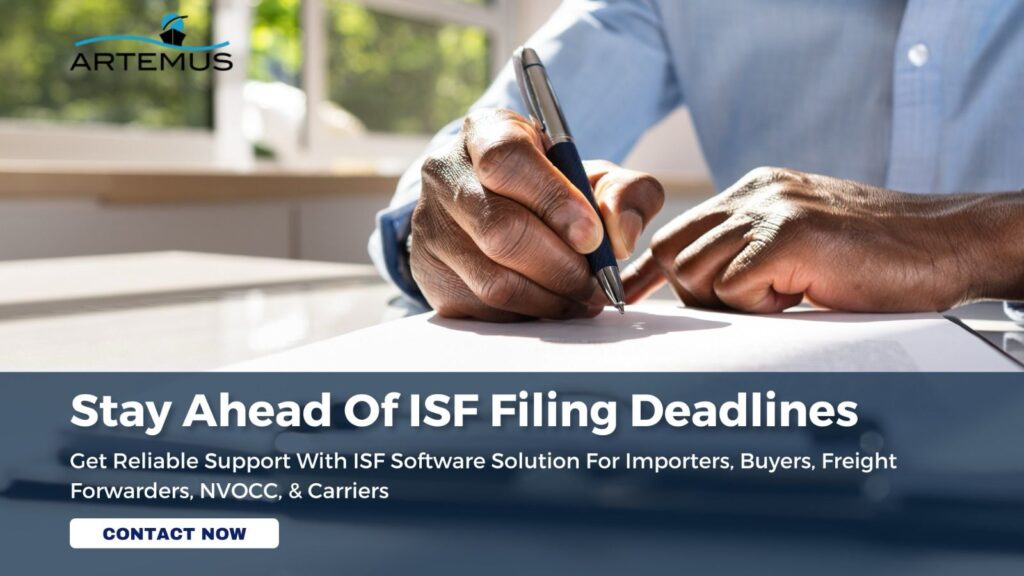
What Is Inbound Logistics & Outbound Logistics? A 2025 Guide
In the dynamic world of supply chain management, understanding the nuances of inbound and outbound logistics is crucial for operational

Becoming a licensed freight broker can open doors to a rewarding career in the transportation and logistics industry. Whether you’re looking to start your brokerage or work with established firms, obtaining a freight broker license is a crucial step toward success.
In this blog, we’ll walk you through the process of getting a freight broker license, from meeting the requirements to passing the necessary exams. Additionally, Artemus Transportation Solutions offers specialized software solutions to assist with AMS (Automated Manifest System) and ISF (Importer Security Filing) filings, making compliance and operations smoother for freight brokers.
Join us as we explore the path to becoming a licensed freight broker and the tools available to streamline your operations.
Table Of Contents
Obtaining a freight broker license is essential for individuals or companies looking to operate as intermediaries in arranging the transportation of goods. Here are eight key requirements to get a freight broker license:
Related: How To Become A Freight Broker With No Experience?
Navigating the process of obtaining a freight broker license involves several critical steps to ensure legal compliance and operational readiness. Here’s a detailed guide on how to get a freight broker license:
Selecting the appropriate legal structure is the first crucial step in establishing your freight brokerage business. You have the option to choose between a sole proprietorship, partnership, limited liability company (LLC), or corporation.
Every structure carries implications for taxes, liability, and operational flexibility. It’s essential to carefully evaluate your business needs and consult with legal and financial advisors to determine the most suitable structure for your freight brokerage operation.
After determining your business structure, you need to secure a USDOT (United States Department of Transportation) number.
This unique identifier is mandatory for all commercial vehicles engaged in interstate commerce and is issued by the Federal Motor Carrier Safety Administration (FMCSA).
To obtain a USDOT number, you must submit an application through the FMCSA’s Unified Registration System (URS) website, providing detailed information about your business and the types of commercial vehicles you intend to operate.
Following the acquisition of your USDOT number, the next step is to register as a freight broker with the FMCSA.
This involves completing the FMCSA’s OP-1 form, also known as the Motor Carrier Operating Authority form, and submitting it along with the applicable registration fee.
During the registration process, you’ll need to furnish comprehensive details about your business, including your legal structure, ownership information, and the nature of your brokerage operations.
To ensure financial security and compliance with regulatory requirements, you are required to obtain a BMC-84 or BMC-85 surety bond.
The BMC-84 bond, commonly known as a freight broker bond, is a $75,000 bond that guarantees payment to motor carriers and shippers in case of broker failure to fulfill contractual obligations.
Alternatively, the BMC-85 bond allows you to deposit $75,000 in a trust fund as a financial security measure. You must obtain the bond or trust fund and file it with the FMCSA to demonstrate your financial responsibility as a freight broker.
After fulfilling the aforementioned requirements, the final step is to complete the freight broker license application process.
Ensure that you have all the necessary documents and information ready, including your legal entity documents, USDOT number, FMCSA registration, and proof of the surety bond or trust fund.
Submit your application to the FMCSA for review, pay the applicable licensing fee, and await approval. Once your application is approved, you will receive your freight broker license, allowing you to legally operate as a freight broker in the United States.
After submitting your application, there is a waiting period during which the FMCSA reviews your application and verifies the submitted documents.
Upon successful verification and approval, you will receive your freight broker license, enabling you to legally operate as a freight broker in the United States.
Related: What Is Freight Forwarder Vs Broker: 6 Key Differences
Preparing for the freight broker license exam requires a thorough study and understanding of the freight brokerage industry regulations and practices. Here are six key steps to help you effectively prepare for the exam:
Begin by familiarizing yourself with the exam’s content and format to understand the topics covered and the types of questions you can expect. Review the exam outline provided by the Federal Motor Carrier Safety Administration (FMCSA) to identify key areas such as regulations, industry terminology, and best practices in freight brokerage.
Gather and study relevant study materials and resources to enhance your knowledge and comprehension of freight brokerage concepts. Utilize textbooks, online courses, study guides, and practice exams designed specifically for the freight broker license exam to reinforce your understanding of critical topics and improve your test-taking skills.
Place a strong emphasis on understanding and memorizing the various federal regulations, licensing requirements, and compliance standards governing the freight brokerage industry. Pay special attention to topics such as FMCSA regulations, insurance requirements, bond obligations, and legal responsibilities to ensure thorough preparation for the exam.
Develop effective time management strategies to allocate sufficient time for studying each section of the exam and practicing sample questions under timed conditions. Practicing time management will help you improve your pacing during the actual exam and increase your chances of completing all sections within the allotted time frame.
Regularly take practice exams to assess your knowledge, identify areas of weakness, and familiarize yourself with the exam’s format and question types. Analyze your performance on practice exams to focus your study efforts on areas that require improvement and ensure comprehensive coverage of all exam topics.
In the weeks leading up to the exam, dedicate time to review and revise all the study materials and notes you have accumulated. Focus on reinforcing key concepts, memorizing important facts and figures, and practicing sample questions to build confidence and readiness for the freight broker license exam.
Related: What Is A Freight Broker & How Do They Work In 2024?
Obtaining a freight broker license offers several key benefits that can enhance your career and business prospects in the freight brokerage industry. Here are five key advantages:
A freight broker license boosts your credibility among shippers, carriers, and industry stakeholders, demonstrating your commitment to adhering to regulations and providing reliable services.
Being licensed ensures compliance with federal regulations and validates your status as a legitimate freight broker, protecting you from legal issues and enhancing your professional reputation.
A license allows you to tap into a broader network of carriers and shippers, providing more opportunities to establish partnerships, negotiate favorable rates, and secure transportation services for clients.
In a competitive market, holding a license gives you an edge over unlicensed brokers by demonstrating industry expertise, regulatory compliance, and a commitment to high standards.
A license opens up new business opportunities, allowing you to expand services, penetrate new markets, and capitalize on emerging trends to maximize revenue potential and long-term success.

Related: What Does A Freight Forwarder Do? Functions & Future Trends
Yes, freight brokers can earn a substantial income through commissions on freight shipments they arrange.
Yes, freight brokering can be a profitable and rewarding business with the right skills and industry knowledge.
The highest salary for a freight broker can exceed $100,000 per year, depending on experience, client base, and industry specialization.

Obtaining a freight broker license involves choosing the right legal structure, obtaining a USDOT number, registering with the FMCSA, securing a BMC-84 or BMC-85 bond, and completing the application process. Following these steps ensures compliance with federal regulations, allowing you to operate legally as a freight broker in the United States and embark on a successful career in the industry.
Related: How To Export From India To USA? A 2024 Updated Guide

In the dynamic world of supply chain management, understanding the nuances of inbound and outbound logistics is crucial for operational

In today’s interconnected world, businesses rely heavily on global trade to expand their markets, access new resources, and drive growth.

Importing goods for resale in the USA presents a lucrative business opportunity, but navigating the complexities of U.S. customs regulations,
Get In Touch
Artemus’ Software Solutions for ISF, AMS, Japan AFR, eManifest Canada, & Panama B2B filings.